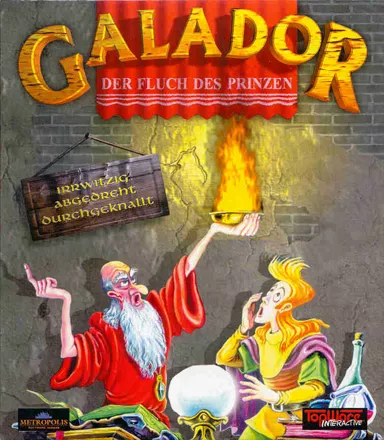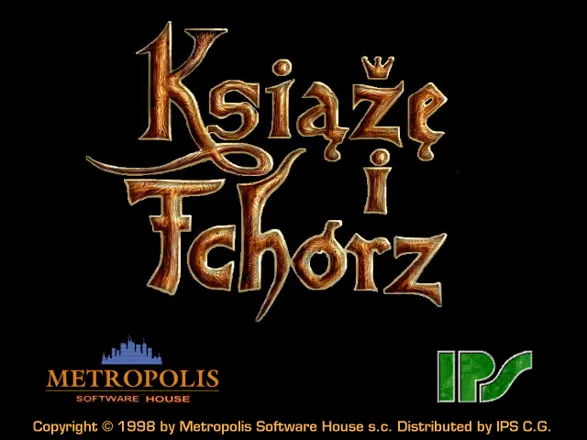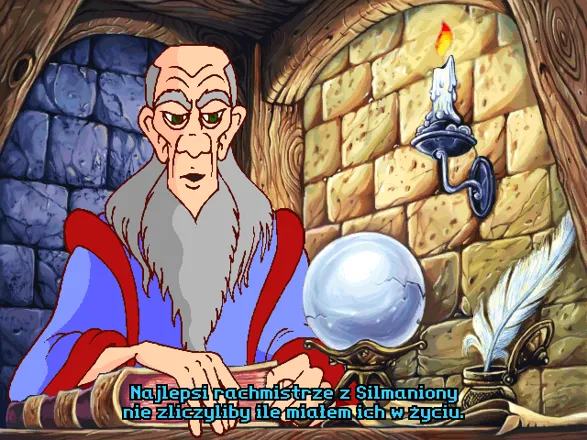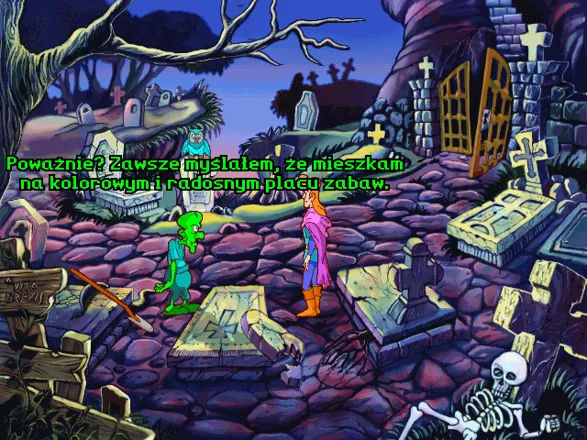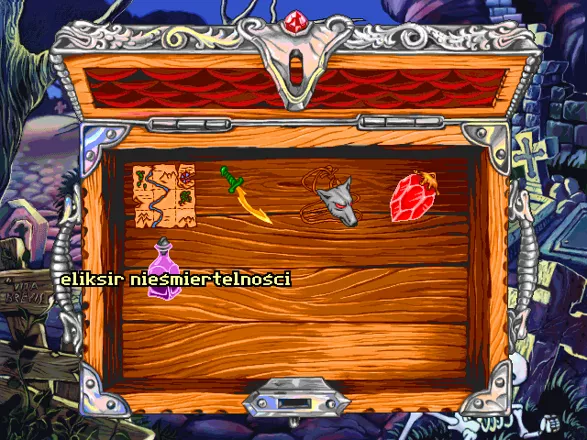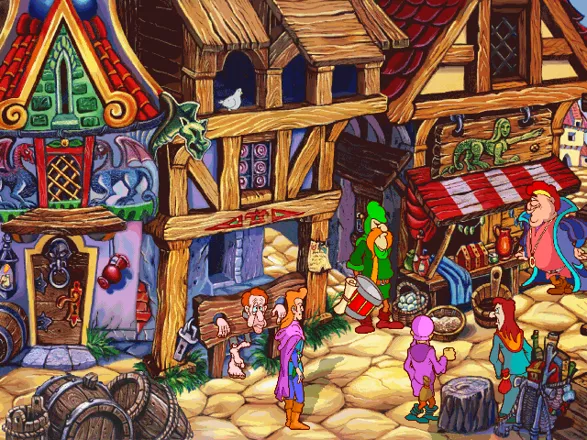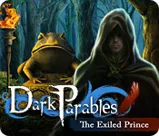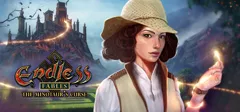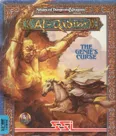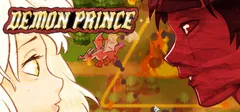Galador: The Prince and the Coward
Description
The Prince and the Coward is a 2D point and click adventure. The game is set in a fantasy kingdom. Young Galador makes a deal with the devil to become a prince and have a life full of adventures. Very quickly, Galador realizes this kind of life is not for him and now is trying to get back his old life.
The game is controlled by mouse (clicking on an item brings up a menu with possible actions) and apart from adventure puzzles, contains some minor arcade sequences.
Spellings
- Галадор: Пpоклятие Пpинца - Russian spelling
Screenshots
Credits (Windows version)
80 People (47 developers, 33 thanks) · View all
| Scenario (Scenariusz) | |
| Dialogues (Dialogi) | |
| Lead Graphic Designer (Naczelny grafik) | |
| Graphics (Grafika) | |
| Animation (Animacje) | |
| Programming (Programowanie) | |
| Music (Muzyka) | |
| Sound Effects (Efekty Dźwiękowe) | |
| Arivald Character Creator (Stworzyciel Arivalda) | |
| Manual Novelette (Opowiadanie w instrukcji) | |
| Cast (Aktorzy) |
|
| [ full credits ] | |
Reviews
Critics
Average score: 73% (based on 13 ratings)
Players
Average score: 4.2 out of 5 (based on 9 ratings with 1 reviews)
As long as you're able to run it, you can have a lot of fun
The Good
While I'm from Poland, I don't care much about playing games in Polish. Since adventure games had helped me greatly expand my knowledge of English in the early 90s, there is hardly a difference for me between playing in Polish and playing in English. Actually, I prefer an original to a poor Polish translation which misses all puns or, even worse, turns up with some nonsense literal translation. On the other hand, it is a bit of a pity that Poland was always rather left behind in the area of game-making. So, with "The Prince and the Coward", we have probably the best Polish adventure game ever made - at least I, disliking 3D graphics and not even bothering to try games such as "The Witcher", would support such a verdict.
The game has lush, funny, cartoony graphics. While they are of the kind with rather thick, distinct, black outlines, at times they remind me of some other fantasy adventures such as Sierra's "King's Quest 7", the most cartoony game in the series. Characters are drawn in a simple way, with very little shading, often they are deliberately rather ugly. While backgrounds are drawn in a different way, with much more shading, the town (and Galador keeps returning there) looks rather cluttered. The beautiful shading can be appreciated best in more "spacious" places such as the forest, the ruins of Silmaniona or the place where Lord of the Sun lives. There is also the map with a beautiful miniaturized rendering of places available. It is used for travelling between locations and they are gradually revealed on the map after Galador is told about them. At about 70% of the game completed, the map is fully revealed.
The dialogues are very funny, with a lot of humorous responses, puns, jokes, even a bit of innuendo. (A little example of a funny dialogue: "- [Who is the Lord of the Sun?] Explain it in simple terms. - He controls the little yellow circle which hurts your eyes when you look at it.") Unfortunately, I have no idea about the quality of German, Russian or English translation. I'm not entirely sure how many translations there were, but it seems that the game was officially published at least in Germany and Russia, and in the latter it was quite popular.
If you don't have the original manual, you won't also immediately know the story. But it is gradually revealed during the game and isn't very complicated: through demonic magic, the soul of a young man who is dreaming of adventures and yet not very brave was put into the body of a prince - at the worst possible moment, which leads to the "prince's" dishonorable escape. To reverse the magic, get his body back and get the real prince's soul back in his body, the protagonist must travel to hell. He is helped mostly by two people: Arivald, a dead wizard who is brought back to life at the beginning of the game, and Shandria, a princess who is independent to the point of almost being nasty to the protagonist. The plot allows visiting many different places and introduces a lot of creative ideas - in a true adventure game fashion, the protagonist collects different objects and then uses them in different places.
The Bad
Unfortunately, the game hasn't aged well in technical terms. Running DOS games can be much easier nowadays than running early Windows games... The game may not run under modern versions of Windows, may not want to run without a CD, may have glitches which require downloading a simple patch... The best idea seems to run it in ScummVM, but it's easier said than done... The game isn't officially supported, so it won't run in official versions of the program. It works great in some of ScummVM's "daily builds" (whatever it is...) - but finding and downloading non-recent ones isn't so easy, I had to ask a pal to send me the one which worked for him. And then, the game is now available in slightly differing versions - some of them will work in ScummVM and some won't. So it took me some time to finally set everything up in the right way.
The game has some arcade sequences which were probably easier then - a little bit slower. Unlike D-Fend Reloaded would (if "The Prince and the Coward" had been a DOS game), ScummVM doesn't allow slowing the game down. An example (caution, spoiler): at the entrance to hell, to beat the devil guard, Galador will have to use an elixir to become faster and use a spell which makes things larger to turn his dagger into a sword. Both only work for a short while and it's not easy to do both before either one runs out, especially since the inventory closes after each action.
I'm not sure how did the game's original save system look like - ScummVM is known to superimpose its own save system over the game's internal one. But it's a pity that the game didn't have a good menu, accessible before starting the game, which would allow, for example, changing sound options are changing game mode from fullscreen to windowed. I happen to dislike fullscreen and using ScummVM was the only possibility to get the game to run in a window.
Some dialogues and cutscenes, while funny, really drag on. The best example is the scene at the very beginning, where Arivald explains the story to some extent - at least 1,5 minutes long, I think.
The Bottom Line
I remember having first read about this game when it was fresh out on the market, but I didn't have an opportunity to play it then. Later I mostly forgot about this little gem (periodically recalling that there was such a game). In the meantime, the game recently turned full 20 years old and now here I am, finally able to play it...
As I said, running the game is not so easy nowadays. But if you get the game in a language you understand and are able to actually run it - by all means try it. It's a high-class adventure game - not very long (at least shorter than I expected), but with a lot of variety and beautiful graphics.
Windows · by Nowhere Girl (8680) · 2018
Trivia
Arivald
Present in the game, the sorcerer Arivald is a character from the series of stories ("Arivald z Wybrzeża" - "Arivald from the Coast") written by Jacek Piekara.
Short PDF novel on CD
The game CD contains a PDF file of a short story called "Es ist nicht alles Gold, was glänzt (und umgekehrt)" - "All that glitters is not gold (and the other way round)" by Jacek Piekara. The story is only loosely connected to the game, but is nevertheless worth reading.
Analytics
Upgrade to MobyPro to view research rankings!
Identifiers +
Contribute
Are you familiar with this game? Help document and preserve this entry in video game history! If your contribution is approved, you will earn points and be credited as a contributor.
Contributors to this Entry
Game added by freaky_hardware.
Additional contributors: Jeanne, Havoc Crow, Karsa Orlong.
Game added October 25, 2007. Last modified January 25, 2024.
